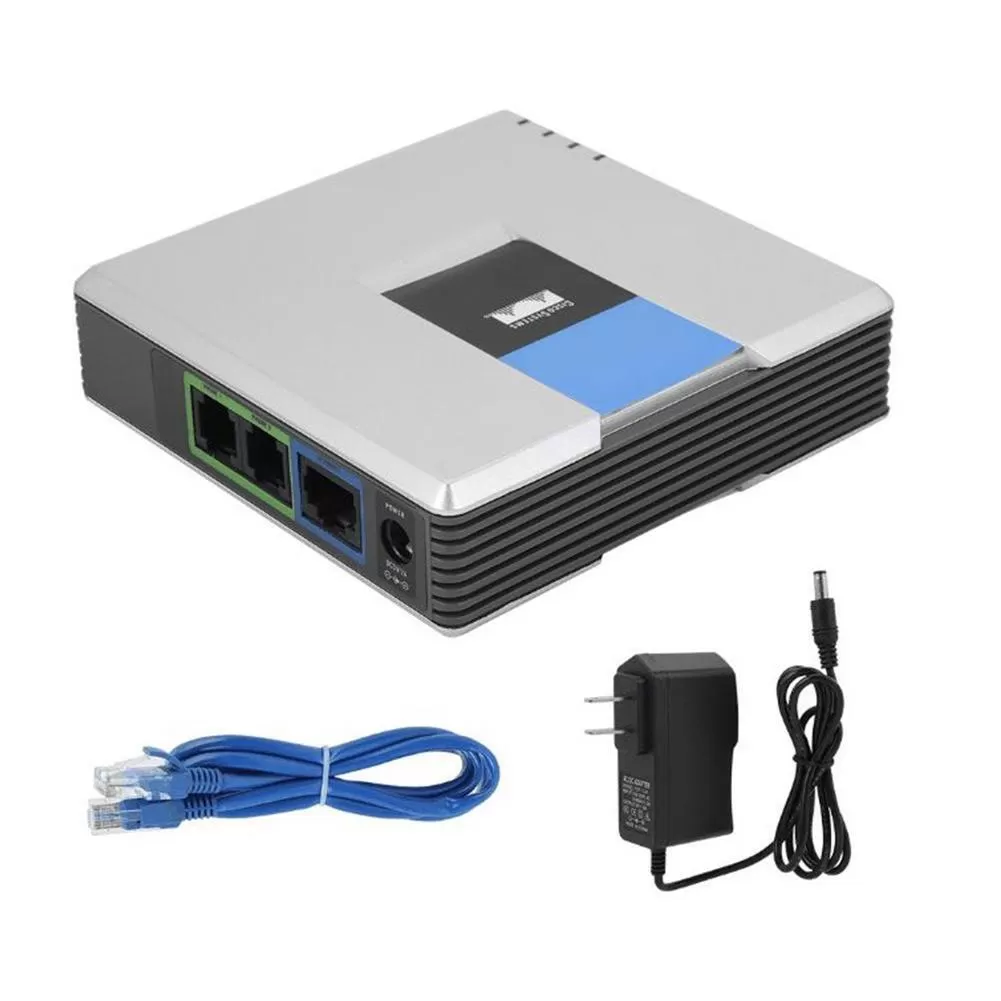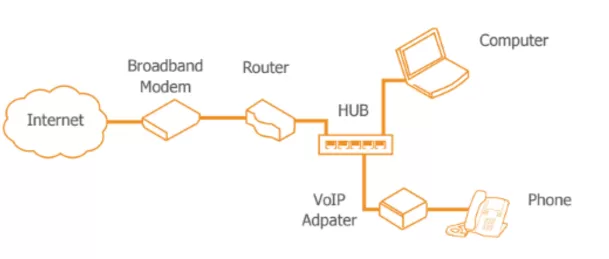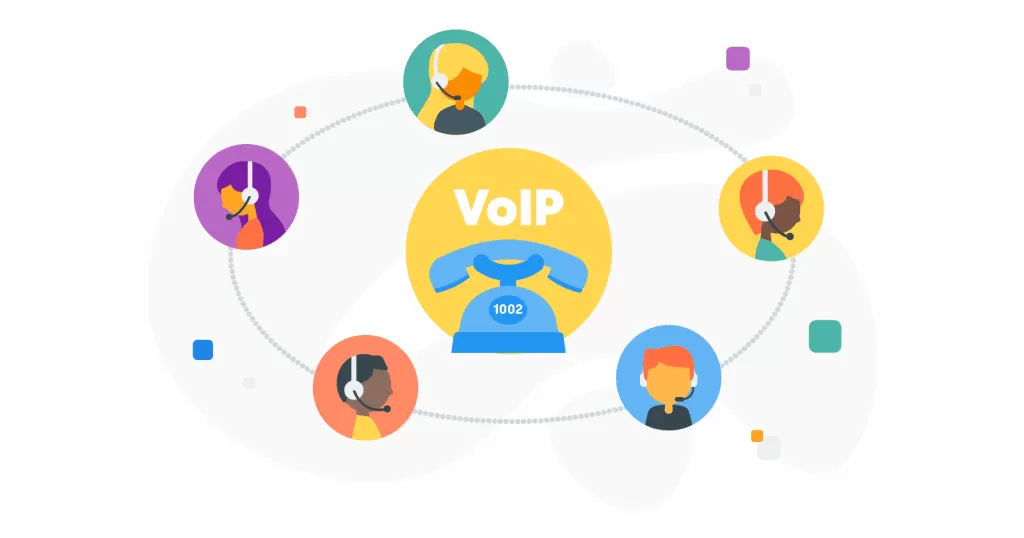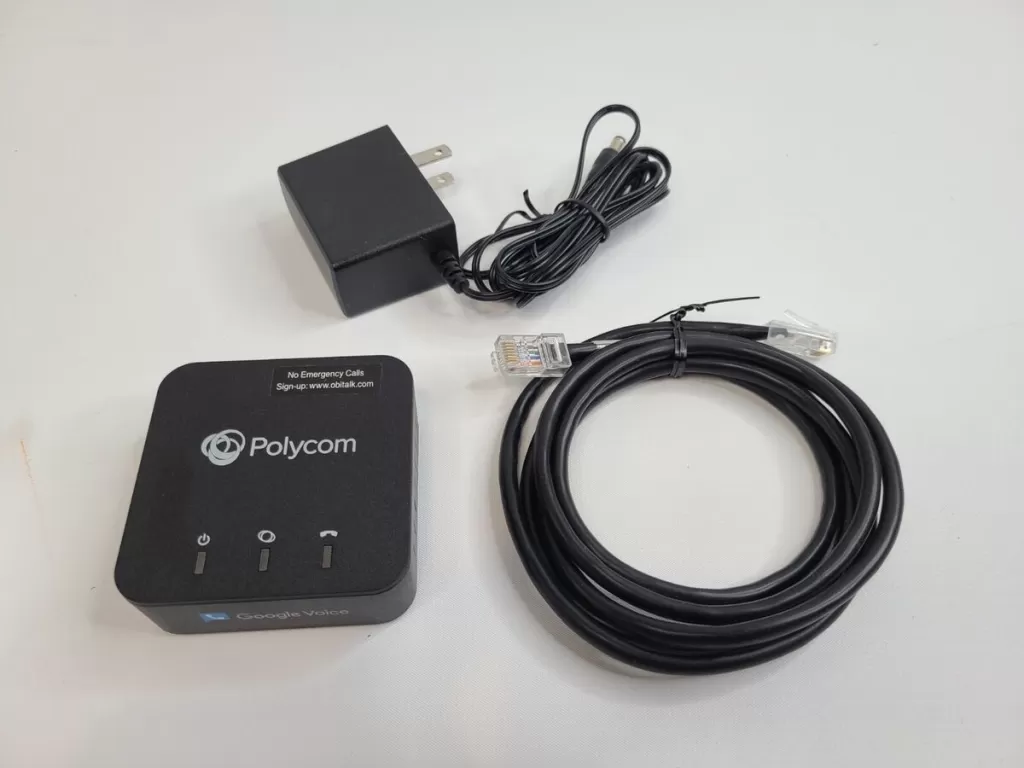Written By:
Scott McAuley
Scott is the IT Director of Texas Management Group, and has been in the IT industry for 25 years.
Did you know that over 1 billion people worldwide are using Voice over IP (VoIP) technology to make calls?
With the increasing demand for seamless communication, VoIP adapters have become an essential tool in the modern era.
In this article, we will delve into the world of VoIP adapters and provide you with a comprehensive understanding of their importance in achieving effortless connectivity.
Whether you’re a business owner or an individual seeking reliable and cost-effective communication solutions, understanding how VoIP adapters work is crucial for staying connected in today’s fast-paced world.
Key Takeaways
- A VoIP adapter, or ATA, converts analog voice signals into digital data packets, enabling traditional phones to connect with VoIP networks for seamless internet-based communication.
- These adapters provide cost-effective communication solutions by bridging analog and digital systems, allowing users to retain existing equipment while accessing modern VoIP features and benefits.
- Various types cater to different needs, from single and dual FXS adapters for connecting phones to FXS/FXO adapters that integrate phone lines, enhancing versatility.
- They offer significant cost savings, flexibility, scalability, and advanced features like call forwarding, enabling efficient communication for individuals and businesses.
- Consider compatibility, features, security, scalability, and support when selecting an adapter to ensure it meets your communication needs and integrates smoothly with your infrastructure.
Table of Contents
What is a VoIP Adapter?

A VoIP adapter, also known as an Analog Telephone Adapter (ATA), is a device that converts analog voice signals from a traditional telephone into digital data packets that can be transmitted over the internet.
This allows analog phones to connect to a Voice over IP network, enabling users to make and receive calls using their existing analog telephone equipment. These analog telephone adapters act as a bridge between the traditional analog phone system and the digital VoIP system.
What Does a VoIP Adapter do?
A VoIP phone adapters play a crucial role in facilitating seamless communication between analog phones and VoIP networks. Its main function is to convert the analog signal into digital data packets that can be transmitted over the Internet.
By acting as a mediator, the VoIP adapter enables integration and compatibility between the traditional analog phone system and the modern VoIP technology. Such as allowing communication between fax machines and computers.
Depending on the specific model and capabilities, a VoIP adapter may offer additional features to enhance communication. These can include call forwarding, call waiting, voicemail, and more. The versatility of VoIP adapters allows users to enjoy the benefits of VoIP services while still utilizing their existing analog telephone equipment.
| VoIP Adapter Functions | Role of VoIP Adapter |
|---|---|
| Converts analog voice signals to digital data packets | Mediates between analog phones and VoIP networks |
| Enables seamless communication integration | Facilitates compatibility between analog and digital systems |
| Offers additional features like call forwarding and voicemail | Enhances communication capabilities |
How Does a VoIP Adapter Work?

A VoIP adapter operates by converting analog voice signals from a traditional telephone into digital data packets, which can then be transmitted over an internet connection. When you initiate a call, the VoIP adapter captures your voice signals and converts them into a digital format.
The adapter subsequently compresses the digital data and sends it over the internet either to the recipient’s device or to the VoIP service provider.
At the receiving end, another VoIP adapter or phone service provider converts the transmitted digital data back into analog signals, allowing the recipient to hear your voice.
What is VoIP?

VoIP, or Voice over IP, is a technology that allows users to make voice calls over an internet connection rather than traditional telephone lines. It stands for Voice over Internet Protocol, and it converts analog voice signals into digital data packets that can be transmitted over the Internet.
VoIP offers numerous advantages over traditional phone systems. One of the main benefits is cost savings. With VoIP, you can make long-distance and international calls at a fraction of the cost compared to traditional phone services. This is especially beneficial for businesses that need to communicate with clients and partners worldwide.
Another advantage of VoIP is flexibility. Since it relies on internet connectivity, you can make and receive calls from anywhere as long as you have an internet connection. This allows for remote work, increased mobility, and the ability to stay connected even when traveling.
VoIP also provides advanced communication features that enhance productivity and collaboration. These features can include call forwarding, voicemail-to-email transcription, call recording, and video conferencing capabilities. With these tools, businesses can streamline their communication processes and improve overall efficiency.
How Does a VoIP System Work?
A VoIP system operates by converting analog voice signals into digital data packets that can be transmitted over an internet connection. The process can be broken down into several steps:
- Voice Capture: When you make a call, your voice is captured by a microphone and converted into a digital format.
- Data Compression: The digital voice data is compressed to reduce the size and make it more manageable for transmission.
- Packetization: The compressed data is divided into small packets, each containing a portion of the voice signal.
- Address Assignment: Each packet is assigned a unique address that indicates its destination.
- Packet Transmission: The packets are sent over the internet to either the recipient’s device or the VoIP service provider.
- Packet Reassembly: At the receiving end, the packets are reassembled in the correct order.
- Signal Conversion: The reassembled digital data is converted back into analog signals.
- Voice Playback: The converted analog signals are sent to the recipient’s speaker, allowing them to hear the voice of the caller.
In addition to these steps, VoIP systems utilize various protocols and codecs to ensure efficient transmission and maintain high-quality audio. These protocols and codecs define the rules and standards for encoding, decoding, and transmitting the voice data packets, ensuring reliable and clear communication.
4 Types of VoIP Adapters
| VoIP Adapter Type | Description |
|---|---|
| 1. Single FXS VoIP Adapter | Connects one traditional phone to a VoIP network. |
| 2. Dual FXS VoIP Adapter | Connects two analog phones to a VoIP network. |
| 3. FXS/FXO VoIP Adapter | Connects analog phones and traditional phone lines to a VoIP network. |
| 4. VoIP Adapter with Built-In Router | Combines the functionality of a VoIP adapter and a network router in one device. |
There are several types of VoIP adapters available, each catering to different needs and setups. These include single FXS VoIP adapters, dual FXS VoIP adapters, FXS/FXO VoIP adapters, and VoIP adapters with built-in routers.
Single FXS adapters are designed to connect one traditional phone, while dual FXS adapters can connect two analog phones. FXS/FXO adapters are more versatile and can connect to both analog phones and traditional phone lines. VoIP adapters with built-in routers provide a streamlined solution for multiple devices, combining the functionality of a VoIP adapter and a network router in one device.
Importance of VoIP Adapter
VoIP adapters play a crucial role in modern communication systems. They enable existing analog phones to connect to internet-based VoIP networks, allowing users to enjoy the benefits of VoIP without the need for new hardware.
By acting as a bridge between traditional analog phone systems and digital VoIP systems, VoIP adapters facilitate the seamless integration of these two communication systems. This makes it easier for businesses and individuals to transition to modern telephony without the need for expensive infrastructure upgrades.
In addition to enabling connectivity, VoIP adapters provide advanced features and functionality that enhance communication capabilities. These may include call forwarding, call waiting, voicemail, and other essential features that improve productivity and efficiency.
5 Benefits of Using a VoIP Adapter
Using a VoIP adapter offers several benefits for individuals and businesses:
1. Cost Savings
One of the major advantages of using a VoIP adapter is cost savings. VoIP services generally have lower rates for domestic and international calls compared to traditional phone systems. By leveraging the internet for voice calls, you can significantly reduce your communication expenses.
2. Flexibility
A VoIP adapter provides flexibility in communication. You can use your existing analog phone to make and receive calls over the internet, eliminating the need for additional hardware investments. This allows you to seamlessly integrate modern VoIP technology without disrupting your established communication setup.
3. Scalability
VoIP adapters offer scalability, allowing you to easily expand your communication system as your needs grow. Whether you have a small business that needs to add more phone lines or a large organization that requires a complex VoIP infrastructure, the adaptability of VoIP adapters ensures smooth scalability.
4. Mobility
With a VoIP adapter, you can enjoy mobility and flexibility in communication. By connecting your analog phone to a VoIP adapter, you can make and receive calls from anywhere with an internet connection. This is especially beneficial for remote workers, traveling professionals, or businesses with multiple locations.
5. Integration
A VoIP adapter seamlessly integrates your analog phone system with modern VoIP technology. This enables you to leverage advanced VoIP features such as call forwarding, voicemail-to-email transcription, and auto-attendant. By integrating your communication systems, you can enhance productivity and streamline your operations.
7 Considerations Before Choosing a VoIP Adapter
Prior to selecting a VoIP adapter, it is important to consider various factors that can impact its suitability for your needs. Here are seven key considerations to keep in mind:
1. Compatibility
Ensure that the VoIP adapter you choose is compatible with your existing analog phone and VoIP service provider. Check for interoperability and compatibility requirements to avoid any potential compatibility issues, such as checking if it has dual Ethernet ports.
2. Features
Assess the features offered by different VoIP adapters and determine which ones are essential for your communication needs. Consider features such as call forwarding, call waiting, voicemail, and the ability to integrate with other communication tools.
3. Quality of Service (QoS)
Verify that the VoIP adapter provides reliable and high-quality voice communication. Look for features such as echo cancellation, noise reduction, and support for audio codecs that ensure clear and uninterrupted voice calls.
4. Security
Consider the security features offered by the VoIP adapter to protect your communications from unauthorized access or eavesdropping. Look for encryption protocols, secure authentication methods, and built-in firewalls to enhance the security of your calls.
5. Scalability
Anticipate future growth and assess whether the VoIP adapter can accommodate your evolving needs. Consider factors such as the number of analog phones you may need to connect in the future and the scalability options provided by the adapter.
6. Management and Configuration
Check the ease of management and configuration options offered by the VoIP adapter. Look for user-friendly interfaces, intuitive setup processes, and remote management capabilities that simplify the administration of the adapter.
7. Reliability and Support
Choose a VoIP adapter from a reputable manufacturer known for producing reliable and durable devices. Additionally, evaluate the level of customer support provided by the manufacturer or vendor to ensure prompt resolution of any technical issues that may arise.
How to Setup VoIP Adapter
Setting up a VoIP adapter is a straightforward process that requires a few key steps to ensure proper functionality.
Follow the guide below for your VoIP setup.
- Connect the VoIP adapter to your analog phone:
- Plug one end of the telephone cable into the designated port on your VoIP adapter.
- Connect the other end of the telephone cable to your analog phone.
- Connect the VoIP adapter to your internet router:
- Insert one end of an Ethernet cable into the LAN port on your VoIP adapter.
- Connect the other end of the Ethernet cable to an available LAN port on your broadband router.
- Power on the VoIP adapter:
- Plug the power adapter into an electrical outlet.
- Connect the power adapter to the power port on your VoIP adapter.
- Turn on the power switch on your VoIP adapter.
- Configure the VoIP adapter settings:
- Access the web-based configuration page of your VoIP adapter by entering its IP address into a web browser.
- Follow the manufacturer’s instructions to enter the necessary network and VoIP settings, such as your SIP account credentials.
- Test the VoIP adapter setup:
- Pick up your analog phone and check for a dial tone.
- Make a test call to ensure that the audio quality is clear and that you can successfully make and receive calls.
By following these steps, you can set up your VoIP adapter and start enjoying the benefits of seamless communication over the Internet.
Conclusion
In conclusion, VoIP adapters play a vital role in bridging the gap between traditional analog phones and modern internet-based VoIP networks.
They serve as the linchpin for seamless communication, providing a pathway for analog voice signals to be transmitted over the internet. VoIP platforms in general offer numerous benefits, including cost savings, advanced features, and enhanced integration capabilities.
When selecting a VoIP adapter, it is crucial to consider factors such as compatibility, features, security, scalability, management, and support. By carefully evaluating these aspects, you can choose an adapter that aligns with your specific needs and integrates seamlessly with your existing infrastructure.
Whether you are an individual looking for enhanced connectivity or a business seeking to streamline your telephony system, VoIP adapters offer a reliable and efficient solution. Unleash the power of digital communication by embracing VoIP adapters and embark on a journey of seamless connectivity.
Interested in Streamlining Communication With VoIP?
Gain insights from our blogs on the value of adapters, and learn how our Hardware as a Service solutions make advanced hardware simple and affordable.
Enhance your setup today!
FAQ
What Does a VoIP Phone Adapter do?
A VoIP phone adapter converts analog voice signals into digital data for transmission over the internet, allowing traditional phones to work with VoIP services.
Do I need a VoIP Adapter?
If you want to use a traditional analog phone with a VoIP service, then yes, you need a VoIP adapter to bridge the gap between your phone and the internet.
How do I Connect my VoIP Adapter?
You connect your VoIP adapter to your internet router using an Ethernet cable and then connect your analog phone to the adapter using a standard phone cable.
Can I Just Plug a VoIP Phone Into my Router?
Yes, if you have a VoIP-enabled phone, you can plug it directly into your internet router using an Ethernet cable without the need for a separate adapter.






